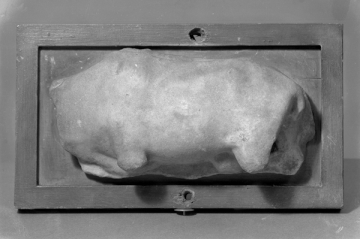Explore Collections


You are here:
CollectionsOnline
/
FRAGMENT OF A RELIEF: A COW WALKING LEFT
Browse
FRAGMENT OF A RELIEF: A COW WALKING LEFT
Post 75 AD
Pentelic marble
Height: 9cm
Width: 19cm
Width: 19cm
Museum number: M1166
On display: Museum South Passage
All spaces are in No. 13 Lincoln's Inn Fields unless identified as in No. 12, Soane's first house.
For tours https://www.soane.org/your-visit
Curatorial note
Against a slightly irregular (landscape?) relief background a young cow walks left; the head (which is missing) appears to have been slightly lowered, as if the animal were being led or feeding. The body structure, legs, udder and tail are clearly represented. The carving is of fine careful workmanship with an excellent feeling for bovine anatomy and a pleasing style.
Compare the fragment of a processional relief in the Lateran1 and also the cow eating leaves in a relief in the Vatican2.
There is an echo of Myron's cow here, as that famous statue appeared on gold and silver coins of Vespasian and his sons about 75 AD.3 Myron (mid-fifth century BC) sculpted a heifer which was said to be so lifelike that it appeared to be breathing and about to bellow - it was so convincing that calves tried to suckle from it. Myron's gilded bronze cow stood in the Agora (place of public assembly) at Athens until it was brought to the Imperial Museum at the Temple of Peace in Vespasian's Forum in Rome. In both places the animal inspired ancient poets whose works are extant in the so-called Greek Anthology. Coins and reliefs spread its fame across the Roman Empire.
This fragment must surely have appealed to Flaxman because of its anatomical accuracy.
1 T. Schreiber, Die Hellenistische Relifbilder, pl. LIIIa.
2 T. Schreiber, Die Hellenistische Relifbilder, pl. CIXa; W. Amelung, Die Skulpturen des Vaticanischen Museums, Berlin, 1908, Vol II, pl. 42, no. 218.
3 See H. Mattingly, Coins of the Roman Empire in the British Museum, 1930, II, pl. 5 etc.
Compare the fragment of a processional relief in the Lateran1 and also the cow eating leaves in a relief in the Vatican2.
There is an echo of Myron's cow here, as that famous statue appeared on gold and silver coins of Vespasian and his sons about 75 AD.3 Myron (mid-fifth century BC) sculpted a heifer which was said to be so lifelike that it appeared to be breathing and about to bellow - it was so convincing that calves tried to suckle from it. Myron's gilded bronze cow stood in the Agora (place of public assembly) at Athens until it was brought to the Imperial Museum at the Temple of Peace in Vespasian's Forum in Rome. In both places the animal inspired ancient poets whose works are extant in the so-called Greek Anthology. Coins and reliefs spread its fame across the Roman Empire.
This fragment must surely have appealed to Flaxman because of its anatomical accuracy.
1 T. Schreiber, Die Hellenistische Relifbilder, pl. LIIIa.
2 T. Schreiber, Die Hellenistische Relifbilder, pl. CIXa; W. Amelung, Die Skulpturen des Vaticanischen Museums, Berlin, 1908, Vol II, pl. 42, no. 218.
3 See H. Mattingly, Coins of the Roman Empire in the British Museum, 1930, II, pl. 5 etc.
From the collection of the neoclassical sculptor John Flaxman.
Soane collections online is being continually updated. If you wish to find out more or if you have any further information about this object please contact us: worksofart@soane.org.uk


